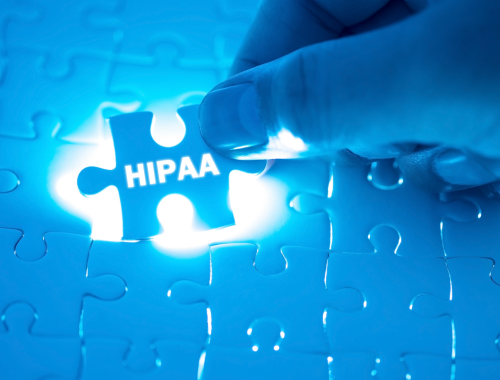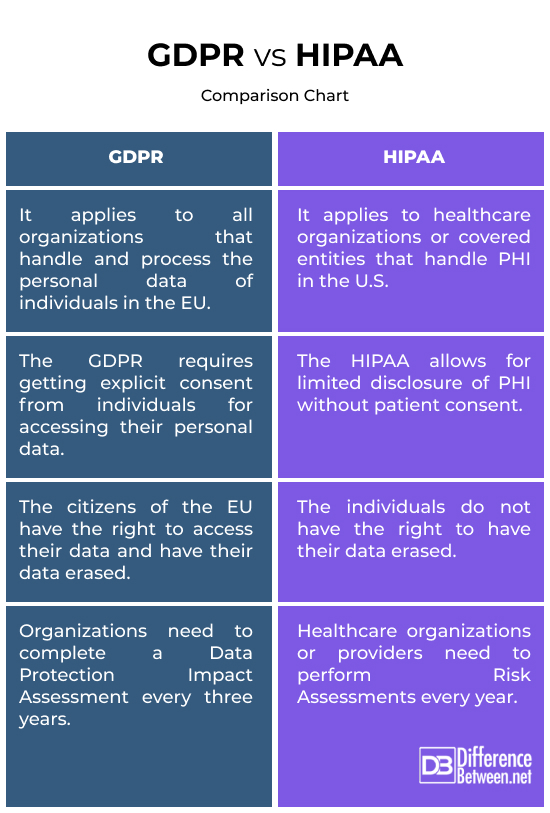Difference Between GDPR and HIPAA
GDPR and HIPAA are two of the most important compliance standards that govern the use and protection of personal data. Both are two important pieces of legislation that share common principles with the same goal of protecting individuals’ privacy. They regulate the way how personal data or information is used. While both regulations have similar goals, they have different scopes and requirements. Let’s discuss the key differences between GDPR and HIPAA in detail. But first, let’s take a look at the two regulations and how they operate.

GDPR
The GDPR, short for General Data Protection Regulation, is a European Union regulation that governs the data privacy laws across the EU and the EEA (European Economic Area). It’s considered one of the toughest data privacy and security laws, which aims to protect the personal data of individuals by setting stringent rules and guidelines for its collection, processing, and storage.
It’s a legal instrument that operates on the principles of lawfulness, fairness, and transparency. The GDPR aims to give control back to citizens over their personal data and imposes regulations on organizations handling their data. If organizations fail to comply with the GDPR, it can result in significant fines.

HIPAA
The Health Insurance Portability and Accountability Act of 1996 (HIPAA) is a U.S. law that applies to all healthcare organizations that handle protected health organization (PHI) data. The law regulates the use and protection of individuals’ sensitive health information. The legislation was passed by Congress and signed into law by then-President Bill Clinton and came into effect on 21 Aug. 1996.
The HIPAA ensures privacy and security standards for protected health information, mandates data breach notifications, and gives patients control over their health data and medical information. The goal is to provide continuous health insurance coverage, fraud enforcement, and administrative simplification for covered entities.
Difference between GDPR and HIPAA
Scope of Law
– The GDPR applies to all organizations and industries that handle and process the personal data of individuals across the EU, as well as entities that handle individuals’ data on behalf of those organizations. The HIPAA law, on the other hand, applies to healthcare organizations or covered entities, such as healthcare providers that handle and process protected health information in the U.S.
Consent
– The GDPR requires explicit consent from individuals for accessing their personal data. The individuals have the right to withdraw consent. The HIPAA, however, allows for limited disclosure of PHI without patient consent. For instance, healthcare providers can share PHI with other providers for medical purposes, such as treatment. In some situations, healthcare providers can disclose PHI to other providers without patient consent.
Individual Rights
– Under the GDPR, the citizens of the EU have the right to access their data, correct records, have their data deleted, and the right to restrict the processing of their data. Individuals have the right to be forgotten, which is as good as erasing the data. The HIPAA, however, gives fewer rights to individuals, including the right to access, transfer, and modify their healthcare data. But they don’t have the right to have their data erased.
Data Breach Notification
– Under the GDPR, organizations are bound to notify the relevant authority of any possible data breach within 72 hours. They are also required to notify the individuals if the breach is likely to impact their rights. Under the HIPAA law, organizations must notify the individuals as well as the OCR (Office of Civil Rights) of a possible breach of data within 60 days if the breach affects 500+ individuals.
GDPR vs. HIPAA: Comparison Chart

Summary
Let’s sum it all up! The GDPR applies to almost all organizations that oversee the personal data of individuals, while the HIPAA is a law of the United States and is more focused on healthcare data. In general, GDPR has stricter regulations regarding data privacy and security than HIPAA. This is because the GDPR oversees the privacy of all individuals in the EU, while HIPAA focuses on protecting the healthcare information of individuals in the U.S.
FAQs
What is the Canadian equivalent of HIPAA?
The Personal Information Protection and Electronic Documents Act (PIPEDA) is the Canadian equivalent of HIPAA. It’s a federal law that regulates the use, collection, and storage of personal data in Canada.
Does Canada use HIPAA?
No, Canada does not use HIPAA. Canada has its own regulating body called the PIPEDA which is similar to HIPAA.
What is the European equivalent of HIPAA?
The GDPR (General Data Protection Regulation) is the European equivalent of HIPAA. The GDPR regulates how organizations collect, use, and store personal user data in the EU.
What is the US equivalent of the GDPR?
There is no direct equivalent of the GDPR in the U.S. However, some US laws, such as the CCPA (California Consumer Privacy Act) and the VCDPA (Virginia Consumer Data Protection Act), have similar data privacy provisions.
Does GDPR apply to Canada?
Yes, GDRP applies to Canada. This is because any organization that processes the personal data of individuals in the EU falls under the GDPR jurisdiction.
How does the GDPR differ from the US?
The GDPR and the privacy laws in the US, such as the HIPAA, share many differences. For instance, the GDPR applies to the EU and its residents, while HIPAA and other US privacy laws are exclusively designed for US citizens.
- Difference Between Caucus and Primary - June 18, 2024
- Difference Between PPO and POS - May 30, 2024
- Difference Between RFID and NFC - May 28, 2024
Search DifferenceBetween.net :
Leave a Response
References :
[0]Grimaldi, Didier and Carlos Carrasco-Farré. Implementing Data-Driven Strategies in Smart Cities: A Roadmap for Urban Transformation. Amsterdam, Netherlands: Elsevier, 2021. Print
[1]Sharma, Rohit, et al. Big Data Analysis for Green Computing: Concepts and Applications. Florida, United States: CRC Press, 2021. Print
[2]Dibble, Suzanne. GDPR For Dummies. New Jersey, United States: John Wiley & Sons, 2019. Print
[3]Herold, Rebecca and Kevin Beaver. The Practical Guide to HIPAA Privacy and Security Compliance, Second Edition. Florida, United States: CRC Press, 2014. Print
[4]Image credit: https://www.canva.com/photos/MADCexQ8cgo-gdpr-concept/
[5]Image credit: https://www.canva.com/photos/MADerDyD9Y4-doctor-hand-holding-a-jigsaw-puzzle-with-hipaa-word-concept-healthy-/
